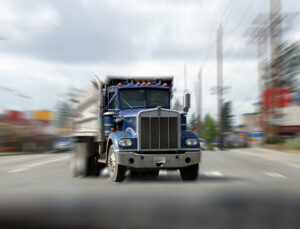Posted in Personal Injury on January 19, 2023

If you or someone you love has been involved in a truck accident, you may be entitled to justice and compensation. However, compared to a basic car-to-car collision, proving liability after a truck accident is often more complicated. This is because a number of parties may be legally responsible for the victim’s damages and injuries.
These include the truck driver, the owner of the truck or trailer, the truck or parts manufacturer, the cargo loader, and the local government in charge of highway maintenance or design.
Let’s take a closer look at these parties and highlight what you should do following a truck accident. Let’s get started.
Truck Drivers
A person injured as a result of a truck accident could sue the driver in the event that they caused the collision because of negligent behavior. This behavior includes distracted driving, fatigue, or speeding.
In the case that a cargo shift or maintenance problem caused the truck accident, a truck may be at least partially responsible for the incident. This is because a truck driver is generally responsible for inspecting their truck for maintenance as well as ensuring that the cargo is properly loaded.
In many cases, a truck driver’s insurance will not fully compensate a person for their damages and injuries, which means that lawyers may look for other responsible parties, such as the driver’s trucking company.
Trucking Company
Trucking companies often attempt to shield themselves from liability. This is done by requiring truck drivers to own their trucks as “independent owner-operators”. The idea, however, that only the truck driver is liable because of this independent contractor relationship does not always hold water.
A number of factors are taken into account when a court decides whether or not a trucking company is also liable. These include the amount of control a trucking company has over the driver and whether or not the driver is able to enter into a contract with other trucking companies.
These and other factors are reviewed by the court and liability is then assigned based on the findings.
Cargo Loader
In cases where a carrier works as a contractor for another company, the shipment they are transporting may be sealed for the entirety of the time the trucking company deals with it. In this case, liability may fall to the cargo loader who improperly loaded or secured the cargo.
Overloading the trailer, using incorrect straps, and not using sufficient tie-downs are all possible reasons that resulted in the trucking accident.
Truck and Parts Manufacturer
Often, a truck accident is caused due to a defect that resulted in the driver losing control. Examples of this include:
- Brakes failing
- Tire blows out
- Steering problem occurs
In some cases, the above failures may occur due to poor maintenance on the part of the driver or the trucking company. However, it may also be the case that the failed part was defective. This potentially implicates the truck or parts manufacturer/distributor.
Local Government
If the road on which the truck accident injury took place, local governments (as well as their contractors) may be held liable for a crash. For example, if a road had:
- Defects such as broken pavement
- A flawed design
- An area of pooled water
Defective guardrails and insufficient road warning signs are two other possible causes of a trucking accident that is attributable to the local government or its contractors.
In all of the above scenarios, it is recommended that you consult with an experienced lawyer who understands the truck accident laws in your state.
Steps to Take Following a Truck Accident
In the first instance, you should seek immediate medical treatment for yourself or anyone else injured in a truck accident. If you are in a position to, notify the authorities about the accident.
Similarly, if you are able to, be sure to get the truck driver’s information. This includes their contact and insurance information. Ask the truck driver whether they are an independent contractor, an employee of a trucking company, or operating a vehicle under a lease.
It is also beneficial to take photographs of the truck accident scene. This includes the position of your vehicle and the truck, road signs, and signage/logos on the truck itself. Also take note of the weather and road conditions, as well as any other conditions that might have contributed to the accident.
Next, if you have been injured in a truck accident, be sure to speak to a professional attorney who can help you gather evidence and prove liability for your case. They will help you with every aspect of your case and help you to get the justice and compensation you deserve.
Understanding Truck Accident Liability
The aftermath of a truck accident can be a confusing and difficult time. It is essential that you get the necessary medical attention to treat your injuries. By partnering with an experienced truck accident lawyer, you can rest assured that a strong legal case will be built for you.
In Montana, your premier choice for truck accident law firms is Heenan & Cook. We have more than four decades of experience in personal injury law in Montana, and John Heenan is a former OTR truck driver. Contact our team today and get your free case evaluation.


